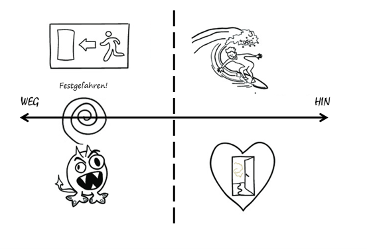Literatur
Bond, F. W. & Flaxman, P. E. (2006). The Ability of Psychological Flexibility and Job Control to Predict Learning, Job Performance, and Mental Health. Journal of Organizational Behavior Management, 26(1–2), 113–130. https://doi.org/10.1300/J075v26n01_05
Habermacher, A., Ghadiri, A. & Peters, T. (2014). The case for basic human needs in coaching: A neuroscientific perspective – The SCOAP Coach Theory, 10(1), 10.
Hayes, S. C. (2004). Acceptance and commitment therapy, relational frame theory, and the third wave of behavioral and cognitive therapies. Behavior Therapy, 35(4), 639–665. https://doi.org/10.1016/S0005-7894(04)80013-3
Hayes, S. C. (2016). Acceptance and Commitment Therapy, Relational Frame Theory, and the Third Wave of Behavioral and Cognitive Therapies – Republished Article (Special 50th Anniversary Issue: Honoring the Past and Looking to the Future: Updates on Seminal Behavior Therapy Publications on Current Therapies and Future Directions, Part II). Behavior Therapy, 47(6), 869–885. https://doi.org/10.1016/j.beth.2016.11.006
Hayes, S. C. (2019). A liberated Mind. How to pivot towards what matters. New York: Avery.
(Dt.) Kurswechsel im Kopf. Weinheim Basel: Beltz 2020.
Hayes, S. C. & Hofmann, S. G. (2017). Process-Based CBT. Oakland, CA: New Harbinger.
Hayes, S. C., Hofmann, S. G., & Wilson, D. S. (2020a). Clinical psychology is an applied evolutionary science. Clinical Psychology Review.
Hayes, S. C., Hofmann, S. G., & Ciarrochi, J. (2020b). A process-based approach to psychological diagnosis and treatment: The conceptual and treatment utility of an extended evolutionary meta model. Clinical Psychology Review.
Hayes, S. C., Strosahl, K. D. & Wilson, K. G. (2014). Akzeptanz- & Commitment-Therapie : achtsamkeitsbasierte Veränderungen in Theorie und Praxis. Paderborn: Junfermann.
Hayes, S. C., Wilson, K. G., Gifford, E. V., Follette, V. M. & Strosahl, K. (1996). Experiential avoidance and behavioral disorders: A functional dimensional approach to diagnosis and treatment. Journal of Consulting and Clinical Psychology, 64(6), 1152–1168. US: American Psychological Association. https://doi.org/10.1037/0022-006X.64.6.1152
Hofer, P. D., Waadt, M., Aschwanden, R., Milidou, M., Acker, J., Meyer, A. H. et al. (2018). Self-help for stress and burnout without therapist contact: An online randomised controlled trial. Work & Stress, 32(2), 189–208. https://doi.org/10.1080/02678373.2017.1402389
Kabat-Zinn, J. (2003). Mindfulness-Based Interventions in Context: Past, Present, and Future. Clinical Psychology: Science and Practice, 10(2), 144–156. https://doi.org/10.1093/clipsy.bpg016
Kabat-Zinn, J. (2011). Gesund durch Meditation. Das grosse Buch der Selbstheilung. München: Knaur. München: Knaur.
Kashdan, T. B. & Rottenberg, J. (2010). Psychological flexibility as a fundamental aspect of health (Positive Clinical Psychology). Clinical Psychology Review, 30(7), 865–878. https://doi.org/10.1016/j.cpr.2010.03.001
Killingsworth, M. A. & Gilbert, D. T. (2010). A Wandering Mind Is an Unhappy Mind. Science, 330(6006), 932–932. https://doi.org/10.1126/science.1192439
Kupfer, D. J., First, M. B., Regier, D. A. (Eds.). (2002). A research agenda for DSM-V. Washington, DC: American Psychiatric Association.
Moran, D. J. (2011). ACT for leadership: Using acceptance and commitment training to develop crisis-resilient change managers. International Journal of Behavioral Consultation and Therapy, 7(1), 66.
Muto, T., Hayes, S. C. & Jeffcoat, T. (2011). The Effectiveness of Acceptance and Commitment Therapy Bibliotherapy for Enhancing the Psychological Health of Japanese College Students Living Abroad. Behavior Therapy, 42(2), 323–335. https://doi.org/10.1016/j.beth.2010.08.009
Onwezen, M. C., Veldhoven, M. J. P. M. van & Biron, M. (2014). The role of psychological flexibility in the demands–exhaustion–performance relationship. European Journal of Work and Organizational Psychology, 23(2), 163–176. https://doi.org/10.1080/1359432X.2012.742242
Skinner, B. F. (1981). Selection by consequences. Science, 213(4507), 501–504. https://doi.org/10.1126/science.
Smart, L. & Wegner, D. M. (1999). Covering up what can’t be seen: Concealable stigma and mental control. Journal of Personality and Social Psychology, 77(3), 474–486. https://doi.org/10.1037/0022-3514.77.3.474
de Vibe, M., Bjørndal, A., Fattah, S., Dyrdal, G. M., Halland, E. & Tanner-Smith, E. E. (2020). Mindfulness-based stress reduction (MBSR) for improving health, quality of life and social functioning in adults: a systematic review and meta-analysis. Campbell Systematic Reviews, 1–264. John Wiley & Sons, Ltd. https://doi.org/10.4073/csr.2017.11@10.1002/(ISSN)1891-1803.Social_Welfare_virtual_issue
Wegner, D. M., Schneider, D. J., Iii, S. R. C. & White, T. L. (1987). Paradoxical Effects of Thought Suppression. Journal of Personality and Social Psychology, 1(53), 5–13. https://doi.org/0022-3514/87/J00.75




